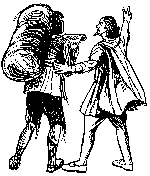
This Page Title – Obedience to the Will of God through the Word of God
The Wicket Gate Magazine "A Continuing Witness".
Internet Edition number 71 – placed on line March 2008
Magazine web address – www.wicketgate.co.uk
Dear Friends,
There was surely something inevitable about those words that Martin Luther spoke as he stood arraigned before the power and authority of Papal Rome: "Unless I am convinced of error by the authority of Scripture," he said, "I cannot, and will not retract. Here I stand, I can do no other …". Inevitable, we say, because Martin Luther, at that crucial point in his Christian life, was making more than an isolated statement relevant only to his own situation. He was expressing a Divine principle that must govern each believing soul in Christ if the "peace of God" is ever to be known and felt in the Christian walk.
The principle involved is the inevitability of obedience to the Will of God when that Will has been clearly revealed to us through the truth that the Lord has committed to us in His Word. We make this the standard for salvation – that the sinner must "believe" and "do" what the Word of God demands of him – why should we suddenly jettison this demand once we have been "brought to Christ?" Luther had explored the Word of the Lord and had discovered that the sinner is justified before the Lord through Faith, and as long as the doctrines and dogmas of Rome denied that precious truth, then, he had no alternative but to oppose himself to them regardless of the cost that might have to be met. He could "do no other."
We get something of the same thing in the life of that man whom the Bible calls "Caleb, the son of Jephunneh;" that one who "wholly followed the Lord." Together with Joshua, he had returned to the camp of the Israelites and, in opposition to the other ten spies who had gone with him to spy-out the land of Canaan, he told the people that they could "possess" the land. He might appear to stand almost alone in the face of popular opinion, but the Lord had revealed His Will to Caleb concerning the conquest of Canaan, and says he, "I brought them word again, as it was in mine heart." You see the inevitable nature of those words again? The Lord had spoke to Caleb, and now, Caleb can "do no other" but repeat what the Lord had placed within his heart – "I brought them word again, as it was in mine heart."
As Amos would have put it, "The Lord hath spoken, who can but prophesy?" Or Paul, when he stood before the Jews his own countrymen, in the city of Rome and reminded them that it was for "the hope of Israel" that he was "bound with this chain." Blessed inevitability! As "servants of Jesus Christ" might we not long to see something more of that spirit pervading our churches and governing our individual lives?
The greatest thing that a believer can be, under Christ, is a servant to His Word. Modernism would call this "Bibliolatry" – worship of the Bible. But we say that apart from the Bible it is absolutely impossible to know Christ savingly, or to do the Will of His father obediently. Those who would want to eliminate our servitude to the Word of God merely want to overthrow the demands of its truth for their lives. But to the obedient child of God, by the enabling of God's performing grace in his life, there is a delight in "doing the truth" – aye, it is inevitable that it be done. For if he is to live with a conscience "void of offence" and enjoy the "peace of God" in his soul, then like Luther, or Caleb or Amos, or Paul, he can "do no other".
This alone explains a Luther's stand before the might of Papal Rome. This alone sees that a Caleb will deliver the burden of his heart even in the face of all opposition. This alone gives the ring of assurance to the prophet's message and shows that it is merely the "echo" of what the Lord Himself has uttered. This alone grants the perfect freedom of life and conscience to those who are "bound" for the hope of the gospel."
How often do we hear a prayer that goes something like this: – "Where is the Lord God of Luther, and Calvin, and Knox, and Whitefield? Where is the God of Caleb, and Amos, and Paul?" I wonder, is there not, perhaps, just a slight hint of complacency in that prayer? Would it not, perhaps, be more in keeping with our obedience unto the Lord if we prayed, instead of "Where is the Lord God of Luther, and Calvin, and Whitefield …?" "Where are the Luthers and Calvins and Whitefields of the Lord God?" Surely, the Lord is ever the same! "Thy truth unchanged hath ever stood." But has not our approach to the truth of God undergone radical changes in this age of the Church's life? "Doing the truth" no longer appears to be a blest inevitability on the part of the professing Church of Christ. "Here I need not stand, I can do all other," would seem to epitomise the Church's philosophy today much more clearly than the words of that big German Monk so long ago.
Would to God we could all place our feet more firmly on that blessed Book of God, and not be ashamed to take up the Reformer's cry: "Here I stand, I can do no other."
W.J. Seaton
The Pastor's Letter (January 1971)

This Page Title – Obedience to the Will of God through the Word of God The Wicket Gate Magazine "A Continuing Witness". Internet Edition number 71 – placed on line March 2008 Magazine web address – www.wicketgate.co.uk |